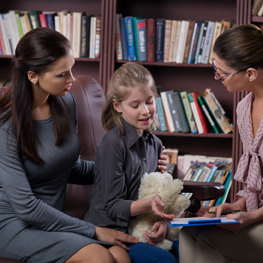
Parents want what’s best for their children, and one of the best things any child can have is a positive experience in education. Outside of the home, school is the place that children spend most of their time. When learning goes well, it can be an amazing experience. Children can discover new talents and skills they never knew they had, and can see the world in exciting new ways. Success at school makes school more fun and exciting for children, which, in turn, makes them more likely to succeed.
Sometimes, though, children struggle to learn. They may feel discouraged and helpless, and the world can suddenly seem a lot scarier for them. For parents, having a child who struggles at school can be a difficult challenge. There are many different ways kids can struggle. For example, some kids may have difficulty with tasks like reading or math. Others might act out in class or be distracted from their work and unable to finish it. There is no ‘one size fits all’ approach to learning, so it can be hard to know how to help, or what to do, without fully understanding why the child is having trouble.
A psycho-educational assessment is a way for parents, teachers and other professionals to understand why and how a child may be struggling to succeed at school. These assessments are collections of smaller tests designed to examine the exact difficulties a child may be having. This might include testing a child’s intelligence, academic skills, emotional state, and the ways the child interacts with other people. A psycho-educational assessment may be carried out by a registered psychologist. Psychologists may work exclusively with the school board, or in the community, and they are specially trained in the area of assessment. The psychologist will meet with parents and school personnel to talk about how the child is doing at school, as well as any relevant information, such as their medical and family history. This will help the psychologist decide which assessment tools to use.
In most cases, a psychologist will usually begin with an intelligence test. This test measures how successfully children use information, based on their age. The psychologist will observe how well a child can solve problems both with and without using language. They may also test how much a child can remember, and how quickly they can think a problem through.
Psycho-educational assessments can often include achievement tests. These measure skills children use at school, such as reading, writing and math. This helps teachers and parents to understand a child’s specific strengths and challenges when doing school tasks. As a parent, you might be able to see your child is having difficulty learning how to read. An assessment helps to see exactly what reading skills are causing these problems. This allows teachers and parents to plan specific ways to help meet the child exactly where they are academically.
A psycho-educational assessment may also measure how a child is doing with their emotions and behaviors. There are a number of tests to assess anxiety, depression, attention difficulties or social skills. These are all things that can impact how well a child can learn. A child may have the skills to tackle anything school might throw at them, but they may be too anxious to use those skills, or may not be able to focus long enough to use those skills.
When an assessment is done, parents will have a comprehensive understanding of their child’s strengths and challenges. The psychologist will make a number of recommendations specific to how a child thinks, feels and learns. Parents can then work together with schools to come up with specific plans to help the child succeed. For the child, this means that school can become something that works the same way they do. They can have a better chance at accessing and understanding the information they need to learn. And when that happens, they can have a better chance of success, and school can become more fun and exciting for them.
For more information about a psycho-educational assessment, contact Bryan Hume, Intake Coordinator at Hull Psychological Services, at 403-589-1865.
Calgary’s Child Magazine © 2024 Calgary’s Child